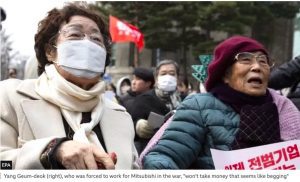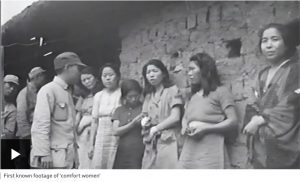South Korean protesters denounced the compensation plan in Seoul on Monday
South Korea has controversially agreed to pay compensation to its own citizens who were forced to work in Japanese factories during World War Two.
Seoul’s proposal aims to resolve a colonial grievance that has long hindered relations between the nations.
Officials on both sides hailed the proposal as a breakthrough on Monday.
But victims and opponents of the plan in South Korea have criticised the agreement, saying it does not hold Japan accountable.
About 150,000 Koreans were forced to work in factories and mines in Japan in the war, due to Japan’s colonisation of the Korean peninsula from 1910-1945.
On Monday, protesters in Seoul held demonstrations outside South Korea’s foreign ministry to condemn the plan by their government, which will see South Korean companies pay into a public fund for victims.
Meanwhile, Japan’s government welcomed Seoul’s move away from demanding two Japanese firms pay compensation. Previous South Korean governments had attempted to make Tokyo pay reparations.
In 2018, South Korea’s Supreme Court ordered Japanese companies to compensate 15 victims of forced labour. But the companies – among them Mitsubishi and Nippon Steel – refused, sparking further animosity.
However South Korea’s President Yoon Suk-yeol, elected last year, has sought to mend relations with Japan – another US ally in the region. The US has pressed both nations to improve their relations.
US President Joe Biden called the deal “ground-breaking” on Monday.
Seoul’s plan proposes that South Korean companies who benefited from a 1965 post-war treaty will pay donations. The fund of $3m (£2.5m) will be distributed among the families of 15 original plaintiffs, only three of whom remain alive.
All three have said they will refuse to accept the money.

Earlier, South Korea’s Foreign Minister Park Jin had unveiled the proposals, saying he believed it was in the national interest to break “the vicious cycle”.
He hoped Japan would “positively respond… with Japanese companies’ voluntary contributions and a comprehensive apology”, Yonhap news agency reported.
“If we compare it to a glass of water, I think that the glass is more than half full,” he told journalists.
Japan’s foreign minister Yoshimasa Hayashi also welcomed the plan, saying his government would allow domestic firms to join the public fund. He expressed hope that political and cultural exchanges between the neighbouring countries would expand.
But groups representing plaintiffs in Korea criticised the deal.
“The Korean government effectively provides immunity to the accused Japanese firms from legal obligations,” lawyers for the victims said in a statement.
“I won’t take money that seems like the result of begging,” said one victim, Yang Geum-deok, according to Yonhap. “You must apologise first and then work through everything else.”
South Korea’s main opposition Democratic Party leader Lee Jae-myung called the deal “the biggest humiliation and stain in diplomatic history“.
It remains to be seen if Japanese firms named in the 2018 court ruling will make voluntary contributions.
Mitsubishi and Nippon Steel would not comment on the deal, both referring to previous statements that the issue of wartime compensation had been dealt with in the 1965 treaty, Reuters news agency reported.
That treaty included a reparations package of about $800m in grants and cheap loans. Tokyo maintains it settled all claims relating to the colonial period – but Seoul has long disputed this.

The new deal is expected to allow both nations to overcome a huge obstacle in their relationship – and thereby co-operate more closely on security, at a time when mutual threats posed by North Korea and China are increasing.
Since 1945, there have been a series of bilateral disputes, including the issue of compensation for Korean women who were enslaved by Japan in wartime brothels.
In 2015, a deal was signed aimed at resolving the “comfort women” dispute, with a Japanese apology and the formation of a billion-yen ($7.3m) fund for survivors.
However a bitter diplomatic row ensued three years later when Seoul dissolved the fund on the grounds that it did not to do enough to consider victims’ concerns.
